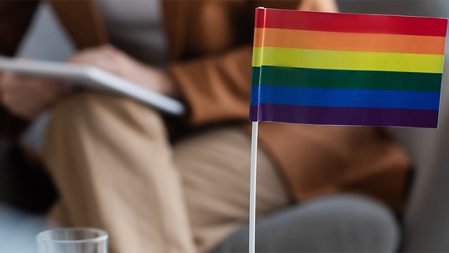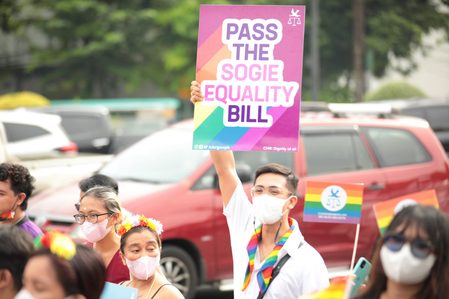SUMMARY
This is AI generated summarization, which may have errors. For context, always refer to the full article.
![[OPINION] The LGBTQ+ should not have to go through adolescence twice](https://www.rappler.com/tachyon/2022/11/2nd-adolescence.jpg)
At 23, and now openly gay, I am going through a second adolescence.
Now that I live far away from my hometown, I’ve gotten the chance to embrace my sexuality with open arms. Psychologists call this the second queer adolescence – a do-over of one’s teenage life among members of the LGBTQ+ community, only this time, in their 20s.
Growing up, I never really had the opportunity to live on my own terms. I had to suppress my identity and abide by the expectations of the people around me. It was difficult to express my sexuality because of the strong patriarchal values and religious beliefs of my family. I was bombarded with insults for acting too effeminate. “Ang lamya mo naman!” my brothers would say. There were times when I was forced into uncomfortable interrogations about my sexual orientation. “Bakla ka ba?” my father would ask.
I was compelled to live through adolescence the only way I knew how – “straight.”
Between true and fabricated identities
At 15, I already knew I was different. But I wasn’t open about it. My admission would mean unfathomable consequences. It was a matter of constantly asking, “Will my family disown me?” or “Am I going to lose my friends?” The safest option was to wear a metaphorical mask and pretend that I was straight.
I had to exist as a closeted teenager, viewing the world through a cisgender heterosexual lens. This meant using my studies as an excuse to not date women despite pressure from my peers. I acted as if I fancied sports whenever my family tuned in to the NBA, when I would rather watch America’s Next Top Model. I shut off my effeminate behaviors at home out of fear of being outed. I had to believe that marriage was only between a man and a woman, so I never dreamt of building a family of my own.
I anguished over how I never got the chance to dance with the guy I liked during the high school promenade. I constantly worried about how to act during sleepovers, afraid of the plausible homophobic remarks of my classmate’s parents. I had to pretend I was interested in “manly” stuff just so I could belong. Thinking about the “what ifs” haunted me every night.
But now that I am 23, no one is telling me to stop being gay. The question “Will they disown me?” has transitioned into “What are they going to do?”
The sad reality about this second queer adolescence, however, is that it is a by-product of the heteronormative society that we have.
The bullying experienced by young members of the LGBTQ+ community forces us to fabricate personas. The inaccessibility of education related to sexual orientation and gender identity and expression leads to misinformed notions about queerness. Religious fundamentalism is shoved down our throats; we are forced to think we are an abomination. The absence of protection for homosexuals and transexuals has led to a culture of impunity for gender-based violence. We had a president who pardoned a convict after murdering one of our transgender sisters. The lack of an anti-discrimination policy coerces us to choose between the right to expression or self-protection, when one should not be mutually exclusive from the other.
We were pushed into the margins after society failed to cushion us from hate. Until now, we’re still treated as the “other.”
Feeling left behind
When I was younger, I never really got the opportunity to maximize what psychologists describe as “developmental milestones,” which are necessary for growth. Developmental milestones are experiences in adolescence that enable individuals to have strong mental faculties in their young adult life. These situations define maturity in decision-making, fight-or-flight responses to challenges, and interpersonal skills. For instance, a gay kid who lives in a welcoming household tends to have better mental health in their adult life.
This isn’t to say that queer kids don’t go through developmental milestones at all. We do. In my initial adolescence, I still had life-altering encounters. I met a diverse set of friends who shaped my actions now. I hung out with a lot of people and learned from them. I consumed various media that influenced my cognitive abilities. I experimented and took risks. The only difference is, I went through these series of checkpoints based on how I was told to live life and not on how I wanted my life to be.
So, at 23, there is a pang of sadness thinking that I am behind the rest.
I abhor the fact that while everyone is living the best of their 20s, I am only starting to understand my selfhood. I thought coming out was the hard part. Dealing with what comes after is even more exhausting.
At a time when I should already be building my career and thinking about the future, I am going through a significant stage in my life, a delayed adolescence. I am stuck in limbo: a cycle of experimenting, a series of failures, and non-stop trial and error in figuring out my identity.
But no matter how much I think about the past, there’s just no turning back.
The right to a just adolescence
There’s no set timeline as to when individuals should embrace their identities. But imagine how the lives of the LGBTQ+ community could be if society was more accepting. We would be confidently walking around the world like it was our runway, free from any contempt and bias.
Nevertheless, although the world had deprived me of a just adolescence, I finally have the chance to drive it in the right direction. Sure, I’m doing it as an older person, but who’s to say it’s any less fun?
I will sing my heart out to Lady Gaga songs. Make no apologies for making out with a guy amid party music and disco lights. Attend a pride march and post all about it on my socials. Dress to impress and care less about people’s judgments. Install dating applications and just see where love takes me.
I may be 23 already, but I will reclaim the past I didn’t have.
Our country has a long way to go when it comes to accepting members of the LGBTQ+ community. Until the government protects our rights through legislation like anti-discrimination policies, future generations will be deprived of the right to be who they are at a young age. Kids will continue to suffer the consequences of having to align their identity with the demands of a heteronormative society.
It is up to us to ensure that young queer kids now don’t go through the arduous process of reconciling with their past and thinking about what could have been.
At 23, members of the LGBTQ+ community should not have to go through adolescence twice. – Rappler.com
Farley Bermeo Jr. is a communication arts graduate from UP Los Baños and a Digital Communications volunteer at Rappler.
Add a comment
How does this make you feel?


There are no comments yet. Add your comment to start the conversation.